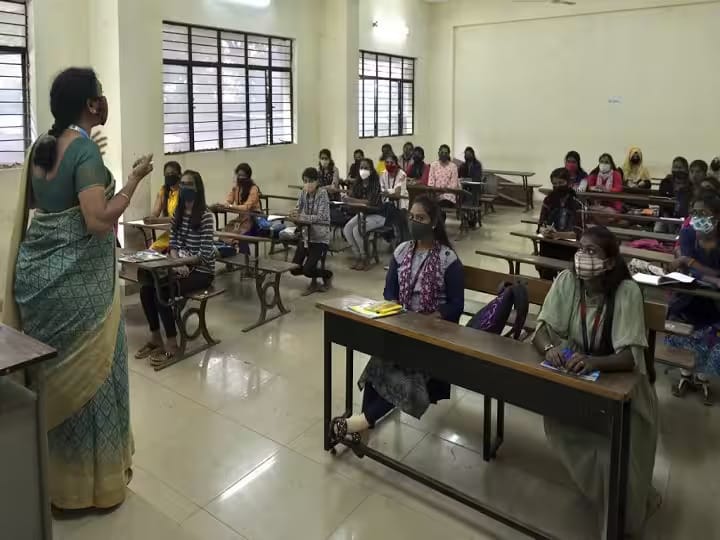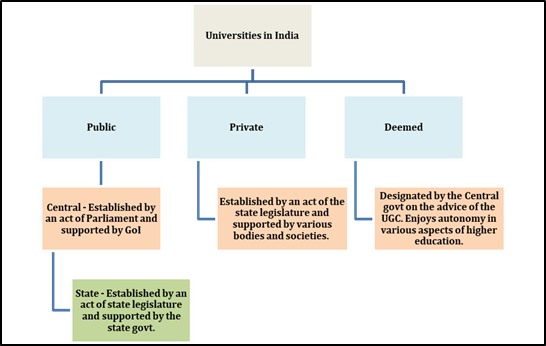What’s in today’s article:
- About the University Grants Commission (UGC)
- About Deemed universities in India
- News Summary
Why in news?
- The Government of India has released the draft UGC (Institutions Deemed to be Universities) Regulations, 2022.
- The draft proposed to remove the requirement that an institute be in operation for at least 20 years before applying for the tag – ‘deemed-to-be’ universities.
- Amendments to the existing guidelines are required to bring them in line with the National Education Policy (NEP) 2020, which calls for the removal of the terms “deemed-to-be university” or “affiliating institution” altogether.
The University Grants Commission (UGC):
Genesis:
- The UGC was established as a statutory body in November 1956 by the UGC Act 1956.
- It is set up by the Ministry of Education’s Department of Higher Education.
- A proposal to replace it with another new regulatory body called the Higher Education Commission of India (HECI) is under consideration by the Government of India.
Mandate:
- The UGC has the unique distinction of being the only grant-giving agency in the country which has been vested with two responsibilities of:
- Providing funds
- Coordination, determination and maintenance of standards in institutions of higher education.
- The UGC`s mandate includes:
- Promoting and coordinating university education.
- Determining and maintaining standards of teaching, examination and research in universities.
- Framing regulations on minimum standards of education.
- Advising the Central and State governments on the measures necessary for improvement of university education, etc.
Deemed universities in India:
Background:
- Universities in India are recognized by the UGC, which draws its power from the UGC Act, 1956.
About:
- A deemed university or deemed-to-be-university is an accreditation granted to higher educational institutions in India.
- According to the Ministry of Education, an Institution of Higher Education (other than universities) that works at a very high standard in a specific field of study might be designated as a ‘Deemed-to-be-university’ by the Central Government on the advice of the UGC.
- Such institutions enjoy the academic status and privileges of a university. Also, the status of deemed university allows for complete autonomy in terms of courses, curriculum, admissions and fees.
- This provision was introduced to ensure that more higher education institutions achieve university status for all practical purposes.
- Under the UGC Act, 1956, university status can be obtained by institutes established under state or union laws.
- As of 2021, the UGC lists 126 institutes that have been given deemed university status.
- According to this list, the first institute to be given deemed university status was the Indian Institute of Science in 1958 and Tamil Nadu has the most deemed universities (28).
News Summary:
- The UGC has released the new draft by reframing, modifying the UGC (Institutions Deemed to be Universities) Regulations, 2019, to make them in line with the NEP, 2020.
- The new regulations will regulate the process of declaring institutions of academic excellence as deemed universities in a systematic manner and to maintain the quality of higher education.
Salient features of draft UGC (Institutions Deemed to be Universities) Regulations, 2022
- The governance structure of the deemed universities will be similar to that of the Central Universities.
- Making multi-disciplinary institutions or a cluster of them, with a minimum of five departments eligible to apply for the deemed university status.
- The 20-year condition to get the deemed university status is waived only in cases where applicants can establish that they will address the strategic needs of the country, engaged in preservation of cultural heritage, etc.
- Such applicants are granted deemed status under ‘De Novo’
- De-Novo Deemed University is an institution which will undertake study and research in unique and emerging areas of knowledge that are not offered by any existing institution.
- The draft regulations also envisage replacing the term ‘De Novo’ with ‘Distinct institution’.
- Such applicants are granted deemed status under ‘De Novo’
- A proposal has been made to simplify the process of sanctioning off-campus centres of deemed universities.
- The approval for off-campus centres will be granted by the UGC. Earlier this approval was given by the Ministry of Education.
- Deemed to be universities will also be eligible to start off-shore campus centres as per UGC regulations on the subject.
- The deemed universities should maintain transparency in fee policy keeping non-profiteering or non-commercial aspects in view.
- Such universities may implement the reservation policy in admissions/recruitment as per the law and may offer online/distance courses/degrees in accordance with the UGC Regulations.
- Government or UGC can conduct enquiry or inspection on complaints in matters of academics, administration and finance or any matter connected with the functioning of such universities.
- In case of violations of the regulations, graded penalties have been introduced.
Last updated on February, 2026
→ UPSC Notification 2026 is now out on the official website at upsconline.nic.in.
→ UPSC IFoS Notification 2026 is now out on the official website at upsconline.nic.in.
→ UPSC Calendar 2026 has been released.
→ UPSC Final Result 2025 is expected to be released in the second week of April 2026.
→ Check out the latest UPSC Syllabus 2026 here.
→ Join Vajiram & Ravi’s Interview Guidance Programme for expert help to crack your final UPSC stage.
→ UPSC Mains Result 2025 is now out.
→ UPSC Prelims 2026 will be conducted on 24th May, 2026 & UPSC Mains 2026 will be conducted on 21st August 2026.
→ The UPSC Selection Process is of 3 stages-Prelims, Mains and Interview.
→ Prepare effectively with Vajiram & Ravi’s UPSC Prelims Test Series 2026 featuring full-length mock tests, detailed solutions, and performance analysis.
→ Enroll in Vajiram & Ravi’s UPSC Mains Test Series 2026 for structured answer writing practice, expert evaluation, and exam-oriented feedback.
→ Join Vajiram & Ravi’s Best UPSC Mentorship Program for personalized guidance, strategy planning, and one-to-one support from experienced mentors.
→ Check UPSC Marksheet 2024 Here.
→ UPSC Toppers List 2024 is released now. Shakti Dubey is UPSC AIR 1 2024 Topper.
→ Also check Best UPSC Coaching in India





















